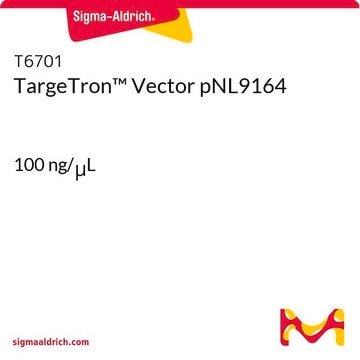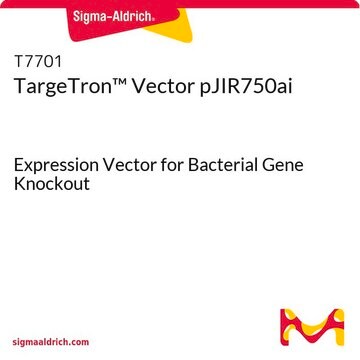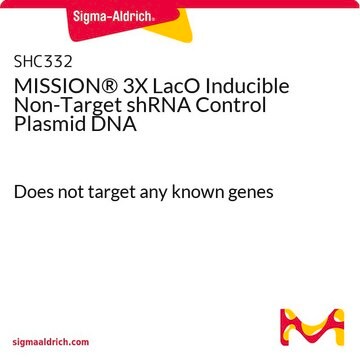T2076
TargeTron™ Vector pAR1219
Expression Vector for Bacterial Gene Knockout
Sign Into View Organizational & Contract Pricing
All Photos(1)
About This Item
UNSPSC Code:
41106610
NACRES:
NA.51
Recommended Products
General description
Plasmid pAR1219 is a pBR322-based vector that expresses T7 RNA Polymerase under control of the IPTG inducible lacUV5 promoter and is intended for use with the TargeTron Gene Knockout System (TA0100).
Application
Many TargeTron system plasmids use the T7 promoter for intron expression. By co-transforming plasmid pAR1219 with the TargeTron pACD4 plasmids, the T7 promoter can be used to express the intron and disrupt chromosomal genes in alternative hosts such as Salmonella typhimurium and Shigella flexneri. Chromosomal gene disruptions in non-DE3 strains of E. coli can also be performed using pAR1219 with the pACD4 intron expression plasmids. TargeTron™ Vector pAR1219 has been used for the overexpression of T7 RNA polymerase in the preparation of S30-T7 lysate. It has also been used to transform MRE600 E. coli strains.
Preparation Note
To use pAR1219 in conjunction with the pACD4 plasmids, simply co-transform both plasmids and select in a liquid medium containing: 50 mg/ml ampicillin, 25 mg/ml chloramphenicol, and 1% glucose. Glucose is typically included to provide additional suppression of the lac UV5 promoter prior to IPTG-induction.
Other Notes
For more information and to view applications data, please visit www.sigma-aldrich.com/targetron.
Legal Information
TargeTron is a trademark of InGex, LLC
Storage Class Code
10 - Combustible liquids
WGK
WGK 3
Flash Point(F)
Not applicable
Flash Point(C)
Not applicable
Personal Protective Equipment
dust mask type N95 (US), Eyeshields, Gloves
Certificates of Analysis (COA)
Search for Certificates of Analysis (COA) by entering the products Lot/Batch Number. Lot and Batch Numbers can be found on a product’s label following the words ‘Lot’ or ‘Batch’.
Already Own This Product?
Find documentation for the products that you have recently purchased in the Document Library.
A simple and rapid method for preparing a cell-free bacterial lysate for protein synthesis.
Krinsky N, et al.
PLoS ONE, 11(10), e0165137-e0165137 (2016)
Synthetic Cells Synthesize Therapeutic Proteins inside Tumors.
Krinsky N, et al.
Advanced Helathcare Materials (2017)
Group II introns as controllable gene targeting vectors for genetic manipulation of bacteria.
Karberg M, et al.
Nature Biotechnology, 19(12), 1162-1162 (2001)
Our team of scientists has experience in all areas of research including Life Science, Material Science, Chemical Synthesis, Chromatography, Analytical and many others.
Contact Technical Service






